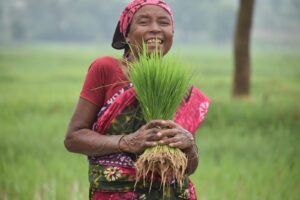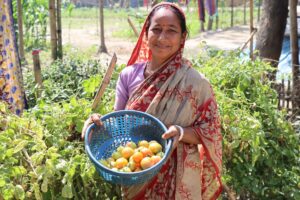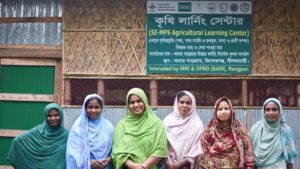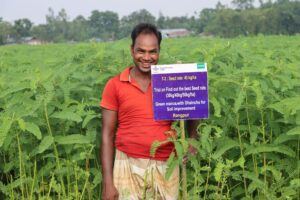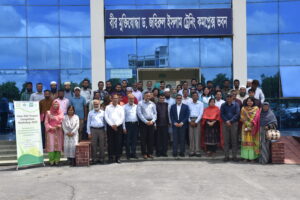By Nusrat Jahan, Muhiuddin Faruquee, and Mohammad Rafiqul Islam
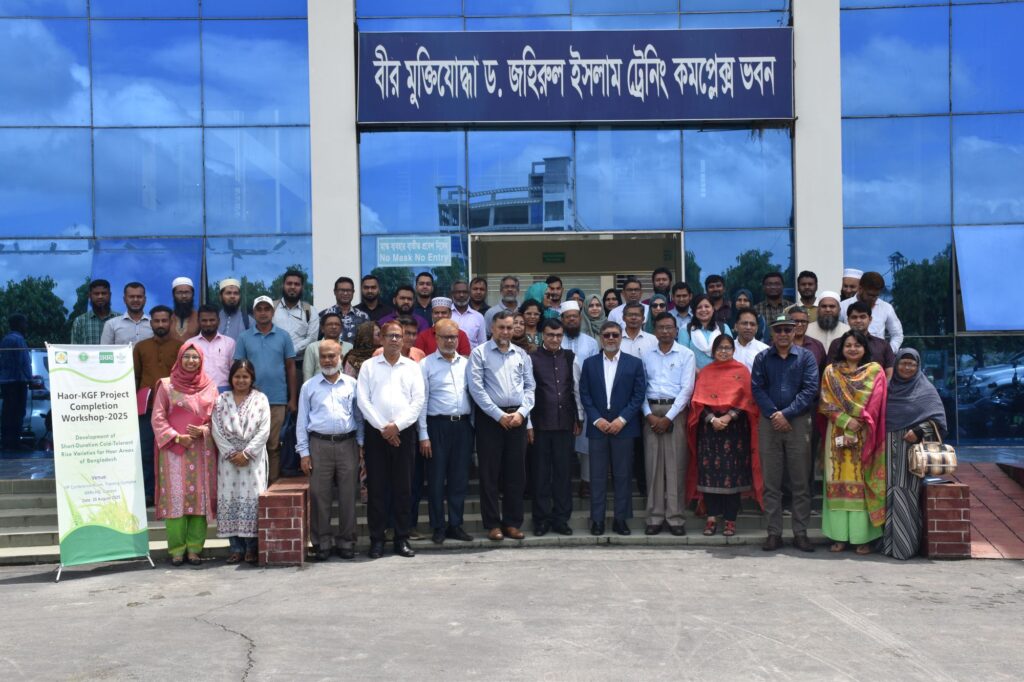
Bangladesh, August 2025 – After five years of intensive research and collaboration, the Haor-KGF project has reached a major milestone: the development of advanced short-duration, cold-tolerant rice lines that can help farmers in Bangladesh’s flood-prone Haor wetlands secure harvests before the waters rise.
Researchers and partners unite at the Haor-KGF Project completion Workshop 2025
At the project’s completion workshop, held at the Bangladesh Rice Research Institute (BRRI) Training Complex in Gazipur, researchers, policymakers, and partners gathered to reflect on achievements and chart the way forward. The project, funded by the Krishi Gobeshona Foundation (KGF) and jointly implemented by BRRI and the International Rice Research Institute (IRRI), set out in 2020 to deliver climate-resilient rice for one of the country’s most vulnerable ecosystems.
Strong outputs in five years
The Haor-KGF project has generated a range of scientific and practical outputs that pave the way for future varietal releases and farmer adoption. It advanced one mature line into the varietal pipeline, now in final approval, while developing more than 2,000 promising lines and screening over 30,000 progenies from 150 crosses. To strengthen breeding efforts, nine mapping populations were created, genome sequencing of 30 donors and recipient parents was completed, and an in-house cold screening facility was established at BRRI with protocols optimized for both seedling and reproductive stages.
Presenting the research outputs, Dr. Partha S. Biswas, Project Lead (BRRI part), CSO & Head of BRRI’s Plant Breeding Division, highlighted- “the project has delivered not only advanced breeding lines but also critical scientific resources such as mapping populations, genome data, and optimized screening protocols. These are assets that will support rice research well beyond this project’s timeline.”
Dr. Md. Akkas Ali, Director (Crops and Natural Resources), KGF added that “together, these achievements lay a solid foundation for delivering short-duration, cold-tolerant rice varieties that will enable farmers to harvest before the floods strike. Mentioning these results mark a turning point he also stated, “we now have materials in the varietal pipeline and advanced lines ready for the next stage. This is a foundation we can build on.”

Voices from the workshop
Speaking as Chief Guest, Dr. Mohammad Khalequzzaman, Director General of BRRI, underlined the strategic importance of the work. “The Haor contributes around 16% of national rice production. Developing short-duration, cold-tolerant varieties is not only a research priority, it is a national necessity. This project has delivered breeding pipelines, candidate varietiy, and technical know-how that will help secure food for millions”.
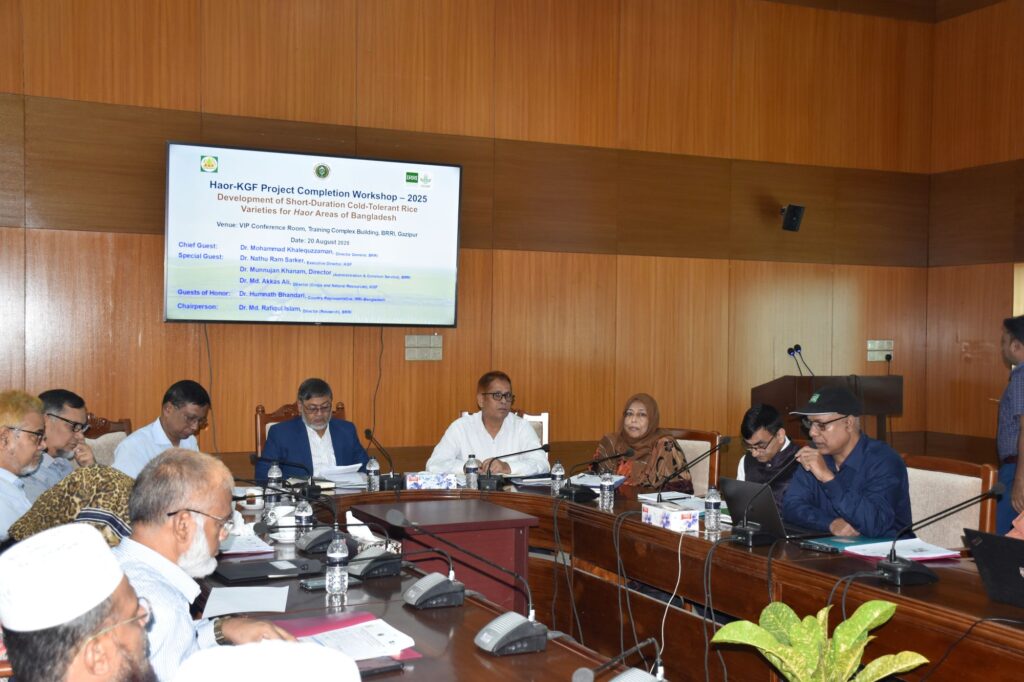
Dr. Nathu Ram Sharker, Executive Director of KGF and Special Guest at the event, praised the project’s achievements and assured future support. “The Haor-KGF project has shown how collaborative research can bring real solutions. The lines developed, the knowledge generated, and the facilities built will continue to benefit the country. KGF remains committed to supporting such initiatives so that the next breakthroughs can reach farmers even faster.”
Dr. Humnath Bhandari, IRRI’s Country Representative in Bangladesh, emphasized collaboration- “this project shows how partnership delivers impact. The proposed variety now in the pipeline, and the advanced lines under development, are results of shared effort between BRRI, IRRI, and KGF. These outputs will directly benefit farmers in the Haor region and strengthen national food security”.
Towards farmer fields
With candidate lines identified, the next step is rapid multiplication and multi-location testing to ensure that new varieties can reach farmers as soon as possible. Dr. Md. Rafiqul Islam, BRRI’s Director of Research and Chair of the workshop said, “we now have strong candidate lines, our task is to take them from trial plots to farmer fields. BRRI, with IRRI and KGF, will continue working to ensure these varieties are released and adopted”.
In his vote of thanks, Dr. KM Iftekharaddaula, CSO and Head of BRRI’s Plant Breeding Division, added- “through this project we have built a robust breeding pipeline, modern facilities, and knowledge that will continue to serve rice research long after the project’s close. The true beneficiaries will be the farmers, who will finally have rice that can withstand cold and escape the annual floods”.
A lasting legacy
The Haor-KGF project has not only delivered breeding lines and candidate varieties but also strengthened scientific capacity, established screening infrastructure, and advanced genomic resources. These outputs lay the groundwork for future innovations, including hybrids, blast-resistant varieties, and nutrient-efficient rice.
In the beginning of the closing workshop, welcome remarks and project overview was presented by, Dr. Rafiqul Islam, Project Lead and rice breeder, IRRI. He said, “this project reflects the true purpose of rice research- science that addresses climate challenges, provides practical solutions for farmers, and reinforces our national food security.”
As the chapter closes on this five-year initiative, the seeds of resilience have been sown. For the farmers of Bangladesh’s Haor wetlands, they promise more than rice – they promise survival, stability, and hope.

